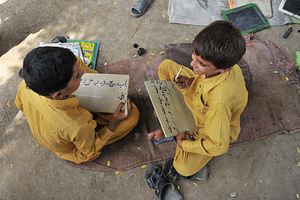A significant number of countries that were emerging out of colonialism in the 20th century made use of tailored versions of history, sanctioned by the state in order to forge a homogeneous nationalist identity. Pakistan was no different.
However, the brand of nationalism propagated by the Pakistani state is nonetheless unique. Its roots can be traced back to the two-nation theory that relegated religion as the dividing factor for Hindus and Muslims in pre-partition India, thus necessitating a separate homeland for the Muslims. After the creation of Pakistan, the Objectives Resolution of 1949 effectively made Islam a permanent part of the constitution, and thereby a fundamental element of Pakistan’s national identity.
Accordingly, the Pakistani education system espouses religious nationalism, which is based on a very parochial definition of what it means to be Muslim. Within those narrow boundaries the identities of minorities are constructed through narratives of inferiority.
Religious Nationalism and Public School Textbooks
A recent report released by the U.S. Commission on International Religious Freedom (USCIRF), titled “Teaching Intolerance in Pakistan,” revealed that public school textbooks circulated to at least 41 million children contain derogatory references to religious minorities. The ubiquitous references in the public school textbooks highlight intolerance through two dominant themes.
First, this intolerance in the education system is in part derived from historical mistrust and enmity with India. Multiple wars and the drawn-out Kashmir conflict have led to the politicization of the curriculum. The syllabus depicts a civilizational divide between Hindus and Muslims, with Hindus being portrayed as inferior and the enemies of Islam.
This historic revisionism in the curriculum further enhances the divide through examples such as the narrative of “oppressive” Hindus during Congress ministries rule from 1937 to 1939 in multiple states before the partition of India. Such a biased depiction allows tensions emanating from the political elite to influence the mindset of the broader society. These perceptions in one way or another also deter the resolution of age-old conflicts, with support from the populace.
Second, religious nationalism in the education system, beyond reflecting regional divides, also leads to polarization within the borders as well. Here, the perception that Hindus present a danger to the survival and existence of Islam is the rhetoric continually applied to other minorities as well.
An extended Islamization of textbooks took place under General Zia-ul-Haq’s military regime in the late 1970s. This period of revisionism led to the introduction of narratives that Christians threaten Pakistan’s Islamic identity. In particular, some textbooks have stated that “Christians need to learn tolerance and kindheartedness from Muslims.”
Beyond religious minorities, denigrating constructions of various ethnicities are also rife in the curriculum. In this case, the recent controversy regarding a sociology book, with a section entitled “sub-cultures of Pakistan” portraying the Baloch as “uncivilized people who are busy in fighting and killing” is highly relevant. The spirit of Baloch nationalism that contains references to separatism serves to undermine religious nationalism and threatens the foundation of Pakistan. Thus, brushing them aside as savages delegitimizes and discounts their demands for freedom.
Rising Intolerance and Internalization of Inferiority
Pakistan’s religious nationalism constructs threats as external phenomena emanating from other religions and ethnicities. Although it has been argued that the problem is not intrinsic to Pakistan’s brand of religious nationalism, it can still be located within the core. The identity of Pakistan treads on dangerous grounds.
The bigotry inherent within the fabricated information doesn’t simply serve to exert power over the minorities. It also indoctrinates the minorities with a sense of inferiority to maintain social control.
Overall, the distortion of historicity for continued enmity toward India and the essentialist construction of other minorities have served to create many enemies. Pakistan’s textbooks are creating generations of close-minded and uncritical individuals that are susceptible to engaging in violence against minorities. In fact, a Pew Research Center Poll conducted in 2013 revealed that Pakistan was among the top three countries in the world with the highest social hostilities towards religious minorities. In this sense, the textbooks inculcate blatant discrimination within the body of students, while making the minorities feel ostracized within their country.
This largely stagnant and rudimentary education system also prevents generational shifts in polarized and dogmatic views. Moreover, it evidently cultivates a binary worldview that is likely to act as a catalyst for increased radicalization and traction of extremist narratives. While many would perceive the madrassas as the source for this mindset, mainstream public education also plays its role in similar ends.
Reforming the Education System
Taking into account the detrimental effects of the education system, there is a need for significant reform. A conference on “Uprooting Religious Intolerance through the Formal Education System in Pakistan” conducted in 2015 called for the removal of hate material against other religions and minorities. As a response to such efforts, the government has made attempts to eliminate negative references in existing textbooks.
However, simply removing the references as and when they are discovered is not sufficient. The syllabus needs to be reformed through introduction of newly published books bringing forth ideals of tolerance and coexistence.
These public school textbooks need examples of acclaimed non-Muslims, such as Abdus Salam, the Nobel Peace Prize Winner, and Alvin Robert Cornelius, the first Christian chief justice of Pakistan. The images of such heroes will challenge previously held notions of the inferiority of minorities. Moreover, the textbooks should promote harmony through celebrating the cultures and traditions of the religious and ethnic minorities, rather than mocking or demeaning them. In the long-run such reforms within the public education system will lead towards changing the mindsets of successive generations, facilitating narratives of bottom-up tolerance.
Sara Mahmood is a Research Analyst at the International Center for Political Violence & Terrorism Research (ICPVTR) of the S. Rajaratnam School of International Studies, Singapore.

































